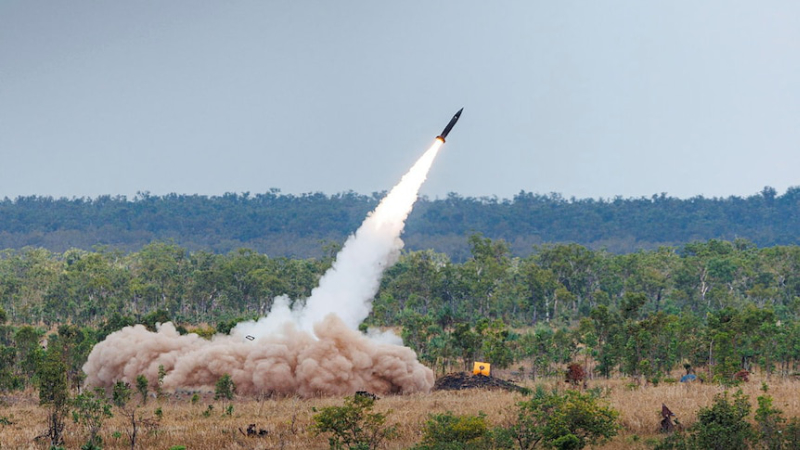In late July, Australia test-fired a new US-made long-range missile. Its range is 500km, but that can be doubled, easily reaching Indonesian targets. Duncan Graham reports.
Were our friends to the north fearful, seeing this armed streaker as a threat? Tariffs, Gaza and Ukraine have elbowed other news aside, so reaction has been limited. The Indonesian media has yet to make a fuss.
The original news came from the ABC, apparently fed by the army, along with photos of toughies in fatigues looking pleased with their achievement.
Defence Industry Minister Pat Conroy was quoted as saying the new weapon marked the day the “Australian Army enters the missile age.”
“It’s all about extending deterrence in the Indo-Pacific, all about signalling to any potential adversary that pain can be inflicted,
all about deterring war through strength.
Another “all about” painless way is through developing close friendships and understanding differences. “Jaw jaw is better than war war”, Churchill allegedly said, but the proverb and its intent have rusted this century.
Did Indonesians know we planned to test the Precision Strike Missile (PrSM) before the red button was pressed? We asked Defence. They replied: “Your email is not considered a valid Freedom of Information request.”
Different strokes for different folks…
We wanted to know because in February, the Chinese Navy “held two live-fire military exercises near Australia and NZ, sparking concern in both countries.” The splash spot was in the Tasman Sea 640 km off the NSW town of Eden, 480 km south of Sydney, i.e. in international waters.
Canberra lodged a diplomatic protest with Beijing; a firestorm followed from the right-wing press, and commentators suggested it was a test run for a Taiwan invasion.
Using this reasoning makes PrSM’s launch a rehearsal for invading Indonesia.
Nonsense! Or is it? Borrowing the Trump xenophobia template, President Prabowo Subianto regularly stokes fears of foreign takeovers, never naming names, but blaming the sinister ‘they’:
“For hundreds of years, they’ve been dissuading us, even now, with money. They fund NGOs to divide us. They claim to be upholders of democracy, human rights, and press freedom. But that’s their own version of events.”
Your correspondent occasionally visits these ‘divisive’ NGOs in their suburban termite palace rentals. It’s been a painful experience using chairs unable to take a foreigner’s weight. There’s an omen here somewhere.
If they do have George Soros as their financier (as Prabowo regularly alleges), the agencies need sturdier seats ahead of any meetings with the portly US investor/philanthropist.
A ghostly future
Even more rickety is the expectation that the Republic will soon be no more, as predicted by “researchers from other countries who have made studies that Indonesia will be gone by 2030.”
Worrying indeed until the source of this dread is revealed as US sci-fi: Ghost Fleet: A Novel of the Next World War. Through Prabowo’s promotion, it has become Indonesia’s 1984, referring to authors Peter Singer and August Cole as “strategic intelligence experts.”
They’re academics specialising in “fictional intelligence.”
Their plot has Indonesia as a failed state after a world war. “Pirates roam its waters without fear and criminals carve up huge swaths of the country … a sex scene has a woman with cybernetic breasts (implantable, neuroprosthetic medical devices).”
Prabowo lapped up the dystopia and the sleaze: “This is a real phenomenon, so if you don’t want to believe me, you don’t want to hear me, that’s OK. It’s my obligation as a citizen; I have to speak up when I see danger.”
Neighbourly trust?
Thinking Indonesians don’t fear Australia, but many do distrust it. There’s been a tangible shift this century from admiration for our role in supporting independence in the late 1940s to suspicion decades later.
“The wariness cuts both ways,” says a Lowy Institute poll. “Australian attitudes towards Indonesia have been, at best, lukewarm. And at worst, they betray a lurking suspicion.”
Professor Tim Lindsey, probably the most insightful of Australia’s few experts on Indonesia, writes of “lingering concerns about the AUKUS deal … and Australia’s role in the independence of Timor-Leste in 1999.”
“This resulted in Indonesia famously tearing up the sweeping security treaty Keating negotiated with (second President) Soeharto in 1995.”
“The loss of Timor-Leste still rankles some senior Indonesian military figures. Australia and Indonesia have signed new security arrangements since then … enabling more complex training exercises between the two militaries. However, none match the scale of the 1995 agreement.”
Regional war games
One of the training exercises is already banging away in Queensland. About 35,000 troops from 19 nations – including Indonesia and the US, though not China – have been playing war games dubbed Talisman Sabre.
As the show-stopper, the PrSM was fired from the Mount Bundey Training Area, south-east of Darwin, flying at more than three times the speed of sound.
The ABC’s threadbare yarn did not report the direction, where it hit or the cost. Like commercial aircraft, missiles are supposed to respect a nation’s airspace – a zone 100 km above sea level called the Karman Line, the imagined boundary with deep space
The Indonesian Island of Flores (population two million) is 830 km north of Darwin.
US Army Secretary Dan Driscoll wasn’t equivocal about PrSM’s purpose: “President Trump, Secretary of Defence Pete Hegseth and the rest of the Pentagon team have been very clear that our pacing threat is China.
We are actively designing our army so that we are capable of responding to any threat from China.
An Indonesian perspective
But is that how Indonesians see the situation?
The PRC may be Washington’s incubus, but it’s not Jakarta’s. Indonesia and China have just celebrated 75 years of diplomatic relations and continue with “trade, infrastructure development, energy, and socio-culture,” according to the Jakarta-based Institute for Essential Services Reform:
Until 2022, China has been Indonesia’s largest trading partner for ten consecutive years.
The trade volume between the two countries increased from AUD 76 billion in 2013 to more than double in 2022.
“Indonesia is the main recipient of investment for Belt and Road projects, around $14.2B… This shows that Indonesia has a role as a strategic partner in China’s political and economic agenda in Southeast Asia.”
This year, Indonesia joined the BRICS trade bloc commanded by China, a rival to the Western-dominated G7. Critics claim it shows the world’s fourth-largest nation is getting closer (the usual term is ‘pivot’, implying a swing away from the West) to Russia and China.
Officially, Indonesia’s foreign policy “is independent and active… Indonesia does not side with world powers …, so doing would be incompatible with the country’s national philosophy and identity.
The best policy to adopt is one which does not make us the object of an international conflict.
That philosophy was embedded before Australia entered the missile age, Donald Trump started calling the shots and Ghost Fleet haunted us all.
BRICS and Bats: the global world order is changing, but who would know?
Duncan Graham has a Walkley Award, two Human Rights Commission awards and other prizes for his radio, TV and print journalism in Australia. He now lives in Indonesia.

